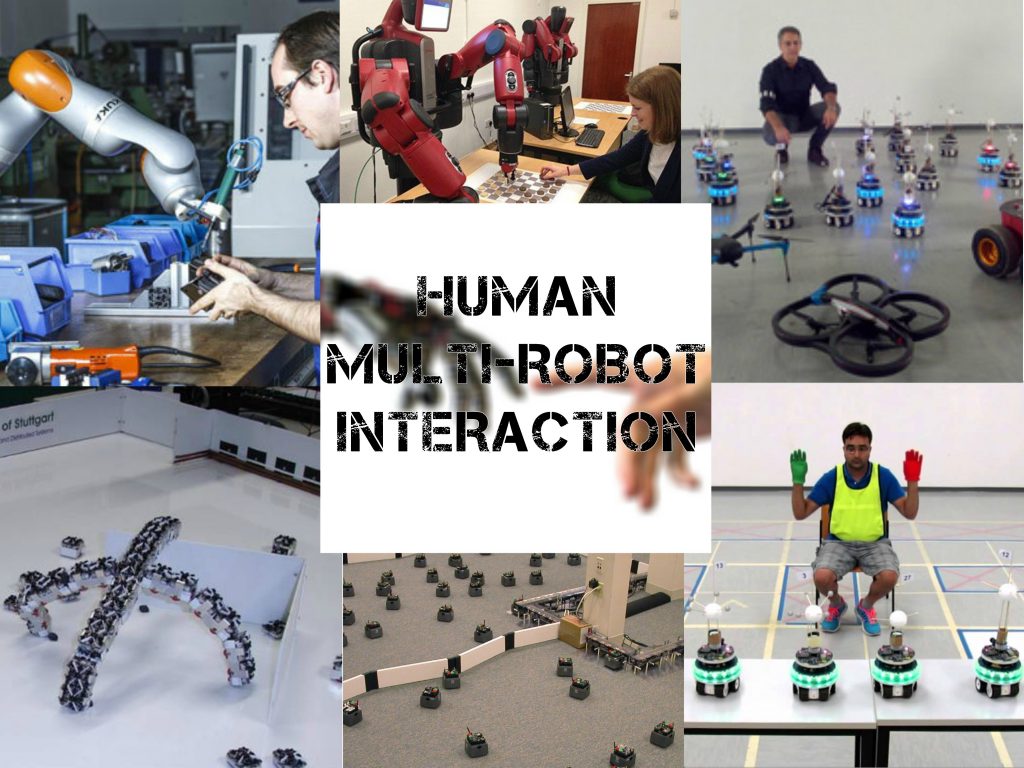
About the workshop

Picture Courtesy[1]http://metropolis.sci.univr.it/altair/events/ias13tutorial/
http://www.nanowerk.com/news2/robotics/newsid=34814.php
http://www.herts.ac.uk/about-us/news/2015/march/draught-playing-robots-at-the-university-of-hertfordshire
http://www.edgefxkits.com/blog/swarm-robotics-the-rise-of-intelligent-group-robotics/
http://www.giannidicaro.com/robotics.html
https://www.youtube.com/watch?v=FQEOhhDULoM
https://www.youtube.com/watch?v=a7CalVfog4U
The objective of this workshop is to present the new developments in human multi-robot systems (MRS) interaction, which is an interdisciplinary research area across the robotics, controls, and human factors communities. We wish to identify the key challenges of MRS systems with human-in-the-loop, to explore the degree to which core elements of MRS research (e.g., distributed algorithms, decentralized planning, etc.) contribute to human-robot interaction (HRI), and to anticipate the future innovation in bringing human and MRS together. This workshop aims at promoting a discussion to identify and define the overarching ideas that can tie together different research direction in MRS and HRI, and lead to the definition of common practices and standards.
A constantly increasing community of researchers has been putting great effort in human-robot interaction (HRI). More recently, the interest in human multi-robot systems (MRS) interaction is motivated by the benefit of synergizing human intelligence with a team of cooperating robots to improve the joint human-robot system performance and reduce manpower and workload.
Researchers interested in HRI and MRS represent an inherently diverse community, since several competences are needed in this field, ranging from control systems to human factors, which include control, mechanical design, estimation, perception, planning, interaction, ergonomics, and psychology, just to list a few. While this fact could represent an incredible richness for human multi-robot systems interaction, perhaps instead it hinders the internal dialogue among researchers across different disciplinary and thus represents an obstacle for the constitution and development of a united field of research like other fields in robotics.
The main objective of this workshop is therefore to present the new cross-disciplinary developments in human multi-robot systems (MRS) interaction. We seek to identify the key challenges, framework, core elements of MRS systems with human-in-the-loop.
Toward this aim we will host a selection of invited keynote speakers that cover many different spirits among the HRI and multi-robot communities. We will ask them to give a historical perspective on their research, a current state-of-the-art, and insights on future trends and research challenges. The workshop will be organized in multiple sessions, each of which will be focused on a fundamental problem or aspect of human multi-robot systems interaction.
An interactive session will also be organized, in order to increase the number and the variety of the participants in the discussion, based on an open Call for Contributions.
The workshop will conclude with an open discussion among the participants, based on the main concepts drawn from the presentations.
References
